McSuppiahs Uttapam
Meet the man who took on McDonalds and won. P Suppiah,a Malaysian born in Tamil Nadu,runs McCurry in Kuala Lumpur. McDonalds sued him for trademark violation.
Meet the man who took on McDonalds and won. P Suppiah,a Malaysian born in Tamil Nadu,runs McCurry in Kuala Lumpur. McDonalds sued him for trademark violation. What followed was a remarkable story of big MNC vs small entreprenuer. Now he gets fan mail from India all the time
You cant have fries with that and no,you cant supersize it either. But yes,it is called McCurry. In the heart of Malaysias capital Kuala Lumpur,within spotting distance of the landmark twin Petronas Towers,stands Restoran McCurry.
The restaurant serves Tosai Masala (masala dosa,as we know it) for 2.50 Malaysian ringgit,Roti Canai (an adapted Chennai parotta) for RM 1.00,Ghee Uttapam (RM 1.70),and even Chicken Tikka (RM 6.00) and Aloo Paratha (RM 2.50).
It is Indian fast food,unmistakably,but the menu is not its claim to fame.
McCurry hit headlines around the globe last year-end for delivering a legal thrashing to the global fast food giant McDonalds in a trademark infringement case in Malaysias highest Federal Court. The one-outlet McCurry thus retained the right to use the Mc identifier in its name.
It was a battle that captured the imagination of Malaysia,a country dominated by Malay Muslims but home also to Chinese and ethnic Tamil Indians.
Now its victorious owner P. Suppiah,55,a third-generation Malaysian who traces his roots back to Tamil Nadu his grandfather came to Malaysia 100 years ago to work on rubber plantations and he himself was born in Tiruchirapalli says he wants to go global with McCurry.
Fresh from the legal triumph,Suppiah,who dabbles in Malaysian real estate market,runs a bistro and dips into the running of his familys palm oil plantations,says he is already talking licensing arrangements with partners in Sri Lanka,Australia and Indonesia.
Since the landmark win against McDonalds,likened by the global media to a David versus Goliath battle,McCurry has become a tourist hot spot. More importantly for Suppiah,the victory has also brought a flurry of overseas franchising inquiries,some 53 from 21 countries at last count.
Suppiah hopes that McCurrys first overseas branch,sporting its trademark logo of a smiling chicken flashing a two-thumbs-up sign,will be in India. I would like nothing more than to bring the McCurry brand to India with the help of a strategic partner, says the affable businessman who was educated in New Zealand.
McCurry certainly has grand designs for the future. But Kuala Lumpurs original McCurry is a modest 24×7 eatery wedged between a 7-Eleven convenience store and a car spare parts dealer on the prominent Jalan Ipoh thoroughfare. It is an all-day,all-night,year-round restaurant that only shuts for two days during Diwali.
Unlike the typical ambience of the American fast food giants outlets,there are no fresh-faced teenagers behind the cash till at McCurry. There are no items with the Mc prefix on the menu. Look around you is there anything here that resembles McDonalds? asks the bespectacled,be-suited Suppiah.
Indeed,there is no evidence that McCurry is trying to confound customers by passing itself off as part of the slicker,global fast food chain. The restaurant is outfitted with old-fashioned formica-topped tables. Overhead fans cool customers as they fight the formidable Malaysian heat.
In fact,there is barely anything Western about McCurry except its casual format. On McCurrys wall are instructions,Easy Steps Order Drinks,Take Food,Collect Drinks,Pay. The popular fare on the menu is a Friday Beryani Special and the spicy chicken curry that gave the restaurant its original name.
As the protracted legal battle wound its way through the High Court and the Federal Court,Suppiah and his wife Kanageswary have maintained that their restaurant did not intend to copy the American fast food chain. Nor did they intend to dilute the global brand name.
It has been a gutsy battle for the Suppiahs in Malaysia which boasts of over 140 McDonalds outlets. In fact,ads for McDonalds Prosperity Burgers are all over Kuala Lumpur city,from Monorail stations to high-end shopping malls,showing the vast footprint of the brand.
All along,the Suppiahs said their own restaurants name is an abbreviation of popular offering,Malaysian chicken curry. During the height of the legal dispute,they were reluctantly forced to drop the c from their name and turn into MCurry.
McCurry has been reinstated,but oblivious to the significance of this legal battle,courteous staff dressed in McDonalds-like golden yellow-and-red colours tend to the flow of customers that include curious American tourists,Indians hankering after some home food and blue-collar Malaysian workers. To cater to this jumble of clients,the wall menus also list Malaysian specialties such as mee goreng,fried noodles,and kway teow,stir fried rice flat-strips,both huge local favorites.
Many small guys would have run scared at the thought of taking on the financial might of McDonalds, says Suppiah. He will not reveal how much he spent on legal fees,but adds,I had nothing to lose but the name.
And everything to gain. Suppiah says McDonalds whose website proudly proclaims that it has sold one billion burgers in over 100 countries and serves 47 million people daily came off looking like a big bully for taking on a small guy like him. For weeks after the courtroom victory,McCurry was inundated with Western tourists. We could not cope with the rush, he says.
Things are just settling back to a saner level at the restaurant. One evening early this month,two Bangladeshi students who gave their names as Jutun and Reuben presented an unusual sight at McCurry. They ate rice and chicken curry with their fingers and licked off the flavours afterwards. This food tastes like home cooking, said Jutun,who vouched for McCurrys popularity amongst a wide gamut of South Asians.
Suppiah has supporters in celebrities like famed photographer Steve McCurry with whom the restaurant shares a name. Early this month,the businessman was readying to welcome the photographer to his restaurant. He quoted McCurry as joking whether McDonalds would next attempt to sue him for using his own name.
It isnt everyday that a modest mom-and-pop business takes on the worlds number one food chain,a 32,000-outlet,4 lakh-plus employee corporation,and wins. Many businesses around the world have fallen flat in trying to taken on McDonalds. In Bangalore,for instance,the global corporation won a case against a bathroom fittings retailer called P.C. Mallappa whose logo resembled the famous golden arches. Legal victory has been elusive except in rare cases such as the McChina Wok Away in London.
Now that he has pulled off the seemingly impossible,Suppiah dreams of turning the ten-year-old McCurry brand into an international chain ready to take on McDonalds in other countries.
He proudly displays newspaper clips of his victory in a dozen Indian-language newspapers. I get fan mail from all over India, he says,showing letters from strangers who say they feel proud that an Indian has won such an important victory.
Suppiah hastens to add that he is all admiration for McDonalds. It is one of the biggest success stories in the world,he says. It is also a business that closely guards its brand.
But the Malaysian trademark battle will open the floodgates for businesses to take on McDonalds in other territories as well,says the man who signs his communication with a flourish,McSuppiah as if daring the American corporation to start another fight. Hes clearly lovin it.
No happy meal
How much trouble could a burger get into? Or ask for? The 70-year-old fast food chain has slapped cases on anyone who uses the word Mc,Mac or its trademark golden double arches: that includes environmental campaigners,coffee houses,Chinese fast-food joints and a hot dog vendor
*One of the most memorable cases which lasted seven-and-a half years was the Mc Libel case. In 1990,McDonalds took environmental campaigners Helen Steel and Dave Morris to court after they distributed leaflets titled Whats Wrong with McDonalds? on the streets of London. It made a number of allegations: McDonalds is complicit in Third World starvation,buys from greedy rulers and elites and practices economic imperialism,wastes vast quantities of grain and water,destroys rainforests with poisons and colonial invasions,sells unhealthy,addictive junk food,alters its food with artificial chemistry etc. Though a UK High Court judge ruled in favour of McDonalds,Steel and Morris went on to challenge UK libel laws in the European Court of Human Rights. The court ruled in their favour and the government was forced to introduce legislation to change defamation laws.
*In 1996,McDonalds forced Scottish sandwich shop owner Mary Blair of Fenny Stratford,Buckinghamshire,to drop McMunchies as her trading name. McDonalds said if someone used the Mc prefix,even unintentionally,they were using something that does not belong to them. But in 2001,it lost a nine-year legal action against Frank Yuen,owner of McChina Wok Away,a small chain of Chinese takeaway outlets in London. The court ruled the McChina name would not cause any confusion among customers and that McDonalds had no right to the prefix Mc.
*Again,in 1996,McDonalds lost a legal battle at the Danish Supreme Court to force Allan Pedersen,a hot dog vendor,to drop his shop name McAllan. Pedersen had named his business after his favorite brand of whiskey,MacAllans. The court ruled that customers could tell the difference between a one-man vendor and a multi-national chain and ordered McDonalds to pay 40,000 kroner in court costs.
*In 2004,the company sued a Cebu-based fast food restaurant,for using the word MacJoy,which according to McDonalds was similar to its trade name. MacJoy insisted that it started its business in 1987 under the title,Macjoy & Device. McDonalds opened its first outlet in the same city only five years later. The owners were forced to change their trademark into MyJoy.
*From the early 1960s to the mid 1980s,Norman McDonald ran a small Country Drive-Inn restaurant in Philpot,Kentucky,in the US called simply McDonalds Hamburgers; Country Drive-Inn. Norman also included a couple of lit golden arches. McDonalds forced Norman to remove the arches and add the full Norman McDonalds name to its sign so customers would not be confused.
The flip side
But while it may look like Ronald McDonald (McDonalds mascot) is on a search-and-sue mission,McDonalds does get a taste of its own medicine from time to time.
*In 1973,Sid and Marty Krofft,the creators of H.R. Pufnstuf ,successfully sued McDonalds,arguing that the entire McDonaldland premise was essentially a rip-off of their television show. In specific,the Kroffts claimed that the character Mayor McCheese was a direct copy of their character,H.R. Pufnstuf. McDonalds was ordered to pay the Kroffts more than $1 million.
*In 2001,Eric Schlossers book Fast Food Nation criticised the business practices of McDonalds. It alleged McDonalds used political influence to increase profits at the expense of peoples health and the social conditions of its workers. It also questioned the companys advertising techniques which target children.
*The term McJob was added to Merriam-Websters Collegiate Dictionary in 2003 to describe a low-paying job that requires little skill and provides little opportunity for advancement. In an open letter to Merriam-Webster,Jim Cantalupo,former CEO of McDonalds,called it a slap in the face of all restaurant employees.
*Morgan Spurlocks 2004 documentary film Super Size Me said McDonalds food was contributing to the epidemic of obesity,and that the company was failing to provide nutritional information about its food. Six weeks after the film premiered,McDonalds announced that it was eliminating the super size option.
Photos


- 01
- 02
- 03
- 04
- 05





























